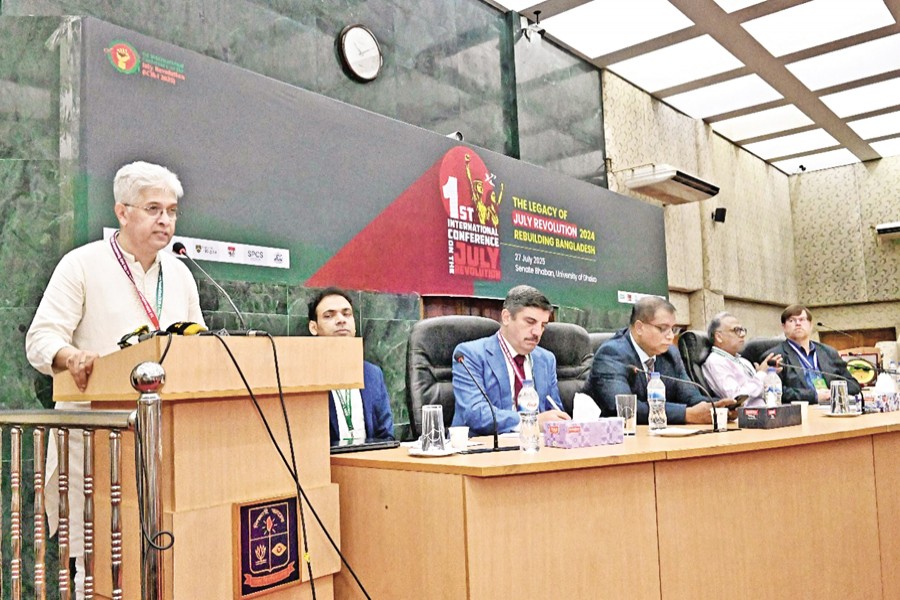July revolution offers a model for the world
Say speakers at an international conference

Published :
Updated :

July revolution offers a model for the world and inspires nations across the globe, said speakers at the first international conference on July revolution (ICJR-1) on Sunday.
The conference, titled "The Legacy of July Revolution 2024: Rebuilding Bangladesh," was jointly organised by a Dhaka-based research organisation, Research and Integrated Thought (RIT), and the Department of Political Science, the University of Dhaka, held at Nabab Nawab Ali Chowdhury Senate Bhaban. Representatives from thirteen other national and international institutions participated.
The event began at 9:00 AM with recitations from holy texts, followed by a documentary on the July mass uprising.
At the conference, parents of Shaheed Zahiduzzaman Tanvin shared some emotional statements. His father said Tanvin joined the movement for the country, not for personal gain. "Still I wait every evening for my son to return home," said his mother and demanded justice before the national election, along with official recognition for the martyrs.
Speaking on the occasion, Nurul Izzah Anwar, Deputy President of Malaysia's Parti Keadilan Rakyat (PKR) and human rights activist, said that Bangladesh's July revolution is now inspiring nations across the world, including Malaysia and Nigeria, by showing a path towards justice and people's empowerment.
She called on the Global South to reaffirm its sovereign right to shape its own future, emphasising the need for economic sovereignty, justice for the marginalised, and meaningful global solidarity.
She drew parallels between the July Revolution in Bangladesh and Malaysia's Reformasi movement, both rooted in resistance to state repression and the pursuit of democratic transformation. "Political reform demands endurance and unity even among unlikely allies," she said.
Addressing global injustices, including the genocide in Gaza, she urged moral clarity and collective action over despair. "Solidarity must be both our shield and our roadmap," she stated.
Touching on digital challenges, she warned against disinformation, polarisation, and algorithmic manipulation. "We must talk across divides, embrace discomfort, and safeguard our democracies from both disinformation and indifference," she urged.
"Let us build coalitions rooted in sincerity, not expediency. Let justice be your compass, dignity your currency, and freedom your eternal flame. The July revolution is not a memory, it's a mandate," she added.
Speaking at the inaugural session of the conference, Adilur Rahman Khan, Adviser of the Ministries of Housing, Public Works, and Industries said, "Let us not fool ourselves. Yes, fascist Hasina has been removed, but the structures of repression, legal, bureaucratic, and psychological, still persist."
Adilur Rahman stated that the event was not merely academic, but a form of public witnessing. "We gather here to remember, reflect, and hold accountable the fascist regime that collapsed after fifteen and a half years of brutal rule," he said.
He accused the previous government of state-sponsored cruelty, alleging that RAB, police, and intelligence agencies were used as tools of terror. Thousands of political activists and journalists were abducted, tortured, and silenced. He slammed the Digital Security Act for criminalising dissent.
Calling for urgent reforms, he said the judiciary must be freed from fear, security forces genuinely restructured, and victims recognised as agents of justice. He also emphasised the need for protecting the student movement, calling it the soul of the revolution. "Reconstruction is hard, but we must now build a Bangladesh where democracy is not just electoral, but ethical," he said.
In his speech, retired US State Department diplomat John Danilowicz dismissed claims that the July uprising was influenced by foreign powers. "It was entirely the result of the Bangladeshi people's own struggle," he said. "To this day, I have seen no evidence of US or foreign involvement. I challenge anyone who believes otherwise to prove it."
Dr Lutfe Siddiqi, Special Envoy for International Affairs to Chief Adviser Dr. Muhammad Yunus, stressed the need to implement the promise of the July revolution through collective efforts. He proposed two levels of reform, wholesale reforms in key institutions such as the Election Commission, Parliamentary Reform Commission, Judiciary and Police Reform Commissions to ensure that no future dictatorship can co-opt these bodies; and retail reforms to ease everyday services like visa processing, customs, land registration, trade union licensing, and business establishment.
Jagoron Foundation Chairman Sharif Banna characterised the July revolution as not merely a political uprising, but a profound institutional and ethical transformation. "The 15-year authoritarian rule under the Awami League left state institutions in ruins. The July revolution was not born in a vacuum; it stands on the legacy of our Liberation War of 1971 and the mass uprising of 1990," he said.
Dr. Saidul Islam, Associate Professor at Nanyang Technological University, Singapore, observed that under Sheikh Hasina's regime, democracy existed only in name while media censorship, judicial politicisation, and suppression of dissent became routine features of governance.
Dr Yasin Aktay, former deputy leader of Turkey's ruling party, emphasised the need to sustain revolutionary ideals in Muslim countries emerging from colonialism. He described Bangladesh's July revolution as a symbol of liberation from colonial and imperial dominance, drawing parallels with the Arab Spring.
The conference hosted more than fifteen distinguished speakers and included 10 live panel discussions. It concluded with a theatrical performance titled "Lal July" at the TSC Auditorium where Mostafa Sarwar Farooqui, Adviser of the Ministry of Cultural Affairs, was present.
armanhossen7971@gmail.com


 For all latest news, follow The Financial Express Google News channel.
For all latest news, follow The Financial Express Google News channel.